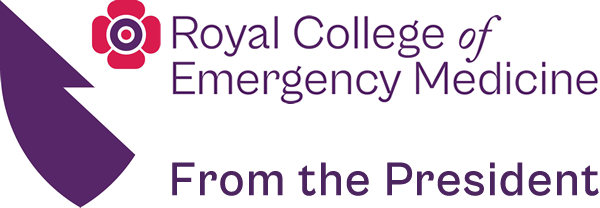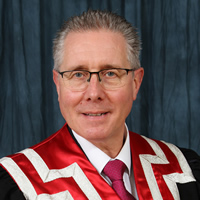Over the past year, whilst the specialty has been at the frontline of the covid-19 pandemic, the College has worked very hard to support you all.
Much of the wider press has been interested in asking questions about our national preparedness and responsiveness and so I have I been asking the same questions of us here at the College.
The College went into the pandemic with all staff commuting into central London and office working being the norm. We did have Crisis Management Procedures worked up in happier times but untested. March 2020 saw us pull them out of the drawer and use them in earnest! Now over twelve months later our Crisis Management Team is still meeting monthly as we continue to evolve and adapt our approach to the twists and turns of lockdowns, Covid waves and vaccination programmes.
As you know we quickly pivoted our face-to-face services into online services last year. We achieved what many thought was impossible: to bring our examinations online in a few weeks rather than months. Our events when online too and virtual conferences and study days became the norm. We rapidly generated and processed a wealth of learning, supported trainees with their dislocated training programmes and much more.
At first there was a sense that this was a temporary change – we would all be ‘back to normal’ at some point. That proved optimistic. Now after having navigated through the emergency, we are focussed on developing our approach to ensure our business-as-usual operations can cope in a world where face-to-face meetings can prove uncertain. For example, we had to shelve our plans for a face-to-face Scientific Conference this year and instead have a fantastic virtual event and Study Days planned.
One area we are focussed on is our responsiveness. This is one of our organisational values. It is important to us because we know that when someone from our membership wants to speak to us they are likely to have little time. They could be at work, between patients or simply using their rest time to reach out. That means we need to reply quickly, answer the phone promptly and solve issues fast.
To help us do that we have focussed on three things:
- We recently launched our Service Centre. This is a helpdesk that provides telephone, web chat and email support. We plan to expand this service to deal with most of our incoming call handling, but first we have focused on Examinations where we saw we needed to provide additional support. We knew that we were receiving more calls and contacts because of the uncertainty and so we have started there. Since its launch in April the Service Centre is handling hundreds of calls and web chats and is making a difference. We plan to develop this good start and to help us do that we have recruited some volunteers from our Membership to advise us on what more we need to do. This Member Engagement Group is already proving valuable to us. We need to know what needs fixing so we can fix it, and they are helping us identify the most important issues
- Secondly and chief among our aims is to fix our website. It is full of largely useful and good content but the navigation, look and feel and poor search functionality are hindering the user experience greatly. We have invested resources in tackling this. We aim to have our new site ready for the Annual General Meeting (AGM) this coming Autumn and are beavering away improving this now in the background.
- Thirdly, we are prioritising investment in resources for our Examinations services. The online examination model is employee-intensive particularly for the OSCEs. It is made more complex because the demands of an MRCEM OSCE are such that it cannot be run simply online so a combination of online and face to face is planned. Our examinations remain very much in demand in the UK and there is pent up demand internationally because we had to cancel overseas arrangements due to the travel bans. Unlike some other organisations we have sought to invest more resources in delivering services for our membership during the pandemic. Our headcount has risen from just over 50 to 63. We are presently reviewing our management and staffing needs as it is likely that we need to put more resources in place to support our Examinations in the coming months.
In addition to reviewing our staff and management resources supporting our Examinations we are always keen to enlist more examiners, if you think you can help with this, please contact: exams@rcem.ac.uk
Those three priorities are not the only ones. As if a pandemic weren’t enough to be going on with, we have our new curriculum planned for this year, and changes to the examinations and eportfolio accompany it. We are currently reaching out to share more about this to help you prepare. Our new eportfolio is developing well and we hope will be a step change improvement for those using it.
We continue to develop our elearning, with new medical developments happening all the time in the treatment of Covid as well as the ‘usual’ challenges facing emergency medicine there is a wealth of great material and further developments planned.
Our Research activities continue despite the challenges of the pandemic and on the policy front, we have had a significant number of issues to work through from the Clinical Review of Standards in England, to challenges such as the return of crowding and trolley waits in emergency departments across the UK.
Looking back over the past year we have moved quickly to ensure we delivered our services to you notwithstanding the pandemic. Our Crisis Management Process was effective. We responded quickly.
We are managing our financial position carefully and this year because of our investment in service improvement, additional IT, the roll-out of the new Curriculum we expect to see a deficit budget. Our plan is to balance the books over the next 2-3 years as we had a financial contingency to weather the challenges we face in a managed and prudent way.
You should be experiencing the benefits of our improved responsiveness. The new website will follow by the AGM. We have some governance changes coming too with a new Trustee Board forming, as you will see from elsewhere in this Supplement.
As you read this in the Summer of 2021, if the Prime Minister has followed his ‘roadmap’, then our offices will be open for employees to work there again for the first time since March 2020. We expect some to want to return to office working, others to remain at home working and some adopting a flexible model. For now, we are not planning Committee or Board meetings in person this year and we hope to restart face to face events and meetings in 2022 Covid permitting.
When you consider our work has been delivered from our bedrooms, lounges, kitchen tables and dining rooms for 18 months it is, I think, a testament to the commitment of our employees delivering for you, our membership.
To help us with our drive to improve our services, do let me know if you think of something we could do better. Email me at: gordon.miles@rcem.ac.uk
Gordon Miles
Chief Executive Officer of the Royal College of Emergency Medicine


